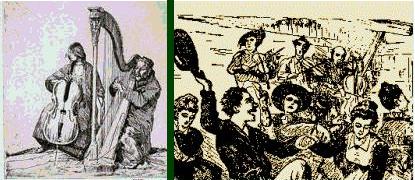Lesseee, I left off in the fall of 2002 playing my home-made fixed-neck washtub bass. It was interesting and different, but it wasn't completely satisfying. I still intended to start anew on a real instrument; I just hadn't decided what. Fiddle had some appeal, but it seemed so difficult; everything goes so fast and fiddle is so hard at first. I had heard beginning fiddlers, ummm, well, it's obviously a long learning curve. None of the other commonly heard instruments were calling out to me yet.
At the time my fiance was interested in starting hammer dulcimer. That instrument had long had a special appeal to her. So one day I went down to a local folkie instrument shop to look at hammer dulcimers for her. I didn't buy one then, but a CD caught my eye, "Simple Gifts" by a group of musicians in Santa Cruz, containing a collection of Shaker tunes. I recognized many of the names of the players from my fiance's old, worn, tapes that we played on long car trips. At the time I vaguely knew the Shakers had left behind a large body of tunes which intrigued Aaron Copland; Simple Gifts was merely the best known because he included it in both Appalachian Spring and his Old American Songs. The CD had hammer dulcimer in it, along with Appalachian dulcimer, flute, alto flute, English horn, violin, viola, mandolin, harp, bowed psaltery, spoons, cello, steel-string and classical guitar, and I forget what else. The arrangements were written by the guitar player, William Coulter, and the cellist, Barry Phillips. I thought maybe she would really like this, and we certainly could use a CD of the Santa Cruz gang instead of those old cassette tapes from the 80's.
When we played it, I was more than impressed. What a superb tribute to those social pioneers! In tune, cleanly played, expertly and imaginatively arranged, with respect and enthusiasm for the values of a humble, devout, plain-living frontier people (when Ohio and Indiana and Kentucky was the frontier) who lived and worshipped by the beat of their own original heaven-sent songs and dances.
Coulter and Phillips had both earned MMs at the San Francisco Conservatory of Music, Coulter's degree is in guitar performance, Phillips' is in composition.
Then there was the cello. Of the CD's 20 tunes on 11 tracks, the cello has the melody on only four of the simple diatonic tunes, usually for only a short time. Elsewhere it plays modest accompaniment, or not at all. All of it sounded so easy, as if no effort or technical difficulty was involved at all -- as easy as singing in the shower, yet, I couldn't take my ears off of it.
(At the time it wouldn't have meant anything to me, but Phillips had been a cello student of Irene Sharp at San Francisco, who in turn was a student of Margaret Rowell.)
And the cello, as played by Phillips, provided something something I had not heard much in folkie music: Inversions! Everything wasn't all 1-5-1-5... ad tedium. The bass lines, pizz or arco, were melodic, adding depth to the already existing height and width of the tunes. It brought class to folk.
One place the cello does play melody is in the Shaker version of the Lord's Prayer (Our Savior's Universal Prayer). It's slow; the notes go only from G at the bottom of bass clef to A at the top of bass clef. Yet, for me it was one of the best parts of the CD. It so evokes an image of an old God-fearing man singing the sacred words in an original ad hoc melody rising directly from his heart.
Too bad I didn't know any cellists; a cello is an arranger's dream, I thought. And for me to start cello was out of the question. Too old... I don't know where to start... I don't know who could teach me... Too out of the mainstream for the musicians I know... Way too expensive... Even more way too time consuming... Ah, but if only I had life to do over again...
A little research revealed that cello tuning would make most of tunes played in the groups and jams I knew very difficult, if not impractical. A lot of shifting at very high speed. It just didn't seem workable.
That CD is still available, or you can hear some samples, each of which has cello in the accompaniment, at Simple Gifts. One can also download it from iTunes. No, I don't get a cut ;-)

Old World or New, Sacred or Profane
Subscribe to:
Post Comments (Atom)
No comments:
Post a Comment